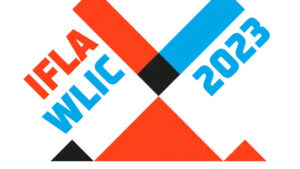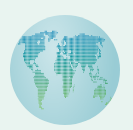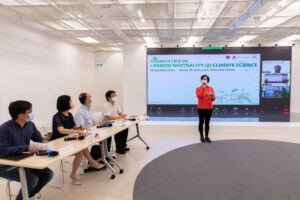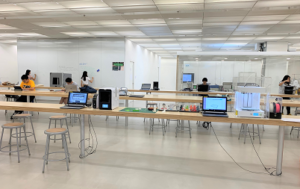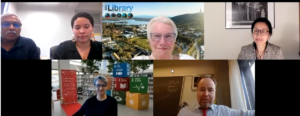This posting is sponsored by the Library Publishing SIG and published in cooperation with the ARL Section. Members of the Library Publishing SIG reach out to library publishers and invite them to respond to a series of questions.
This post features Dave Ghamandi who is the Open Publishing Librarian at the University of Virginia and Managing Editor, Aperio.
What attracted you to work in library publishing?
These comments are from me as an individual and not on behalf of my employer. I worked in two different roles at the University of Virginia (UVA) Library before applying to become the inaugural Open Publishing Librarian. I had built some scholarly communication duties into my first position and wanted an opportunity to do that type of work full-time. The library publishing job was attractive for a few reasons. Mainly, it allows me to be some version of the change I wish to see in scholarly publishing. It’s full of contradictions, but I’m able to lead a diamond open access (no author or reader fees) press as opposed to merely advocating for such change. Advocacy and education are also part of my work, but library publishing allows us to be protagonists in scholarly communication. Building something is often harder work, but at times also more rewarding, than exhorting about exploitative publishing systems.
Library publishing is older than most people probably realize. Virginia Tech has been doing it for decades, for example, so it’s worth noting that we’re engaged in a decades-long practice. Library publishing, even at a small press like Aperio, provides irrefutable, material proof of diamond OA’s benefits. After doing this work for several years, my expectations have tempered though. At the same time, I have a better feel for how library publishing is situated within the larger scholarly publishing landscape, where it’s headed, and the forces it’s in opposition to.
What values and principles inform your work?
The main principle that’s enacted in my library publishing work is decommodification. The articles that Aperio publishes are not exchanged for money, meaning they never become a commodity. Aperio has been a diamond OA press to date, and I hope it remains that way. Working as a publisher with editors, authors, reviewers, and readers in a way that’s not mediated through markets is powerful. The work is riddled with contradictions and shortcomings, but, even in a small way, a certain portion of the literature isn’t subject to profit-motives and the perversities that they bring. No author has ever been turned away for not being able to pay an article processing charge (APC). Authors’ libraries are not billed an APC through a high-priced “transformative agreement.” Authors are not tricked into paying Aperio an APC under the pretense that it would help them satisfy federal deposit requirements. Editors are not pressured into increasing acceptances by 700% or to “cascade” rejections to another journal within Aperio’s portfolio. Library publishers are often relatively modest operations, but there is virtue in scaling small.
What do you think is the impact of library publishing in the broader scholarly communications landscape?
The impact of library publishing is still to be determined, and I struggle to find literature specifically on library publishing that would help answer this question. I’ve been trying to take a more dialectical approach to analyzing library publishing, which entails focusing on contradictions. One such contradiction is how library publishing perpetuates the use of exploited labor (ex. library employees and un(der)compensated editors, reviewers, and authors). This is at the heart of Meetz and Boczar’s article. Another major contradiction is between university support for diamond OA (ex. library publishing and membership programs for the Open Library of Humanities and the Open Book Collective) vs. support for commercial models of OA and green OA. “Transformative agreements,” for example, allow OA to be more fully captured by corporate publishers. Even the OSTP memo is insufficient because it doesn’t create the necessary change at the sites of production. Green OA mandates simply don’t match the severity of the problems we face mainly because they don’t put a real dent into corporate power. It’s difficult to make these points succinctly, but library publishing on its current path doesn’t threaten the publishing oligopoly or the status quo.
What are your hopes and aspirations for the global library publishing community?
My hopes listed here are directly aimed at the fellow rank-and-file publishing librarian:
- We work together to keep weeding out vocational awe and increasingly trade “professionalism”/careerism and individuality for solidarity and cooperation
- We unite based on our common position as workers, study to raise our critical consciousness through political education, and struggle for our collective liberation
- Read and wrestle with Sam Popowich’s work, especially Confronting the Democratic Discourse of Librarianship
- Read and wrestle with Noûs’s Message from the Grassroots: Scholarly Communication, Crisis, and Contradictions
- Study the works of Eileen Joy and Sam Moore
- If the pandemic teaches us anything, we live up to the notions that “We keep us safe” and “It’s all of us or none of us”
Hopefully we can do all these things in a way Cornel West suggests—with style and a smile.
Tell us about a book that changed your life.
There have been a few moments in my life where events yanked me off the sidelines and onto the playing field. One was after tiki-torch-bearing fascists almost killed my co-worker. An earlier moment was watching Richard Wolff’s lecture Capitalism Hits the Fan and reading his book Democracy at Work. Wolff makes a compelling case to reorganize society by democratizing the place where we spend a great deal of time: the workplace. He notes that democracy is an ideal we mostly profess to share, but our workplaces are hierarchical and extractive. Through self-organization, self-management, and collective ownership of our workplaces, we can begin to practice actual democracy, build power, and self-emancipate. It’s a whole lot more complicated than that, hence the plea for political education in the previous answer. But what would scholarly communication look like if researchers, scholars, and associated workers self-managed it and weren’t beholden to “funders” or part-time governing boards? What power would need to be amassed to make that vision a reality?
I need books to fortify the spirit as well, so I’d be remiss if I didn’t mention Fire in the Hole: The Spirit Work of Fi Yi Yi and the Mandingo Warriors. This beautiful book is a collaborative ethnography that dives into the world of Black Masking Indians in New Orleans, Louisiana and chronicles the life of Fi Yi Yi, Big Chief of the Mandingo Warriors. The Black masking culture is rooted in maroonage, resistance, dignity, and African pride. This culture is represented in both the book’s content and form. The concluding chapter, titled “How We Did It,” details the collaborative production process that included oral storytelling, a multiplicity of voices, community peer review, and striking visuals.
Dave Ghamandi, University of Virginia, Blog at http://ghamandi.hcommons.org


